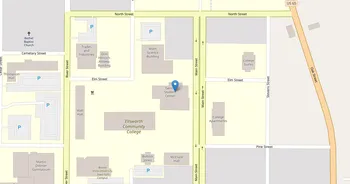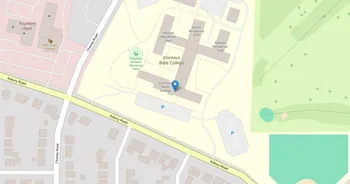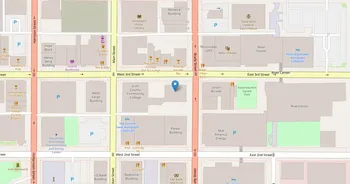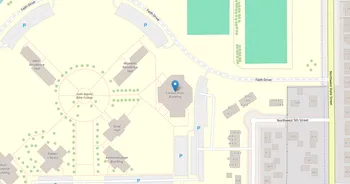University of Dubuque (UD) : Overview, Courses, Scholarships & Rankings
About University of Dubuque
Set near the Mississippi River bluffs, the University of Dubuque blends practical learning with Midwestern warmth. It's known for strengths across the arts and sciences, professional studies, and health-related areas, with teaching-first faculty. Classrooms, labs, studios, and a library sit alongside a fitness center and athletics. Support includes advising, tutoring, writing help, counseling, and a career center.
Campus life is close-knit and active. Expect intramurals, outdoor trips, music and theater nights, and service groups. The vibe is grounded, friendly, quietly ambitious. Career prep leans hands-on through internships and ties to regional employers. Dubuque adds a downtown, riverfront access, and chances to volunteer or work. Traditions? Spirited game days, homecoming, and those late-night study breaks people still talk about.
Key Institutional Details
Contact & Profile
Academic & Institutional
Academic Programs & Fields of Study
University of Dubuque (UD) offers 37 degree programs across 18 major academic fields, graduating approximately 469 students annually. The most popular fields by graduate volume are Business (5 programs, 167 graduates), Transportation (2 programs, 66 graduates), Health (4 programs, 52 graduates), Kinesiology (2 programs, 37 graduates) and Theology (3 programs, 26 graduates). Explore program details, award levels, and graduate demographics below.
Business (5 programs, 167 graduates)
Business Administration, Marketing and Entrepreneurship
| Program Name | Graduates | Gender Distribution | Award Levels | CIP Code |
|---|---|---|---|---|
| Business Administration and Management | 57 |
|
Bachelor's
|
52.0201 |
| Business Administration and Management | 57 |
|
Master's
|
52.0299 |
| Accounting | 22 |
|
Bachelor's
|
52.0301 |
| Human Resources Management | 20 |
|
Bachelor's
|
52.1001 |
| Marketing Management | 11 |
|
Bachelor's
|
52.1401 |
Transportation (2 programs, 66 graduates)
Logistics Management, Supply Chain and Transportation Systems
| Program Name | Graduates | Gender Distribution | Award Levels | CIP Code |
|---|---|---|---|---|
| Airline and Commercial Pilot | 49 |
|
Bachelor's
|
49.0102 |
| Aviation Management and Operations | 17 |
|
Bachelor's
|
49.0104 |
Health (4 programs, 52 graduates)
Healthcare Professions, Medical Sciences and Clinical Practice
| Program Name | Graduates | Gender Distribution | Award Levels | CIP Code |
|---|---|---|---|---|
| Physician Assistant | 23 |
|
Master's
|
51.0912 |
| Registered Nursing | 17 |
|
Bachelor's
|
51.3801 |
| Health and Medical Preparatory Programs | 10 |
|
Bachelor's
|
51.1199 |
| Health Administration and Management | 2 |
|
Bachelor's
|
51.0701 |
Kinesiology (2 programs, 37 graduates)
Exercise Science, Sports Medicine and Physical Recreation
| Program Name | Graduates | Gender Distribution | Award Levels | CIP Code |
|---|---|---|---|---|
| Sport and Fitness Management | 21 |
|
Bachelor's
|
31.0504 |
| Exercise Science and Kinesiology | 16 |
|
Bachelor's
|
31.0505 |
Theology (3 programs, 26 graduates)
Theological Studies, Ministry Preparation and Religious Leadership
| Program Name | Graduates | Gender Distribution | Award Levels | CIP Code |
|---|---|---|---|---|
| Divinity and Ministry | 16 |
|
Master's
|
39.0602 |
| Theological and Ministerial Studies | 7 |
|
Bachelor's
Doctorate (P)
|
39.0699 |
| Theological Studies | 3 |
|
Master's
|
39.0601 |
Education (5 programs, 24 graduates)
Educational Sciences, Teaching Methods and Pedagogy
| Program Name | Graduates | Gender Distribution | Award Levels | CIP Code |
|---|---|---|---|---|
| Elementary Education | 15 |
|
Bachelor's
|
13.1202 |
| Mathematics Teacher Education | 4 |
|
Bachelor's
|
13.1311 |
| English Language Arts Teacher Education | 2 |
|
Bachelor's
|
13.1305 |
| Physical Education Teaching and Coaching | 2 |
|
Bachelor's
|
13.1314 |
| Science Teacher Education | 1 |
|
Bachelor's
|
13.1316 |
Security & Safety (2 programs, 24 graduates)
Emergency Management, Law Enforcement and Public Safety
| Program Name | Graduates | Gender Distribution | Award Levels | CIP Code |
|---|---|---|---|---|
| Criminal Justice and Safety Studies | 19 |
|
Bachelor's
|
43.0104 |
| Forensic Science and Technology | 5 |
|
Bachelor's
|
43.0406 |
Psychology (1 programs, 15 graduates)
Psychological Sciences, Mental Health and Behavioral Studies
| Program Name | Graduates | Gender Distribution | Award Levels | CIP Code |
|---|---|---|---|---|
| General Psychology | 15 |
|
Bachelor's
|
42.0101 |
Communication (1 programs, 12 graduates)
Media Communications, Journalism and Public Relations
| Program Name | Graduates | Gender Distribution | Award Levels | CIP Code |
|---|---|---|---|---|
| Communication and Media Studies | 12 |
|
Bachelor's
|
09.0100 |
Computer & IT (2 programs, 9 graduates)
Computer Science, Information Technology and Cybersecurity
| Program Name | Graduates | Gender Distribution | Award Levels | CIP Code |
|---|---|---|---|---|
| Computer Graphics | 6 |
|
Bachelor's
|
11.0803 |
| Data Processing Technology | 3 |
|
Bachelor's
|
11.0301 |
Admission Requirements & Test Scores
Comprehensive overview of admission criteria, standardized test score ranges, and application requirements for prospective students at University of Dubuque (UD).
Application Requirements
Data based on IPEDS for 2022-2023 academic year. Test score ranges represent the middle 50% of admitted students (25th-75th percentile). Requirements may vary by program.
Tuition, Fees & Estimated Costs
Overview of tuition rates, housing, and other annual education expenses for undergraduate and graduate students
Financial Aid & Student Support
Summary of scholarships, grants, student loans, and financial aid statistics for undergraduate students
Student Success Metrics
Graduation rates and post-graduation earnings to help assess student outcomes and long-term value of education.
Loan Burden & Repayment Outcomes
Breakdown of loan repayment rates and student debt levels by income and dependency status.
Frequently Asked Questions
Find answers to the most common questions about University of Dubuque (UD)
How much does it cost to attend University of Dubuque (UD)?
The annual tuition at University of Dubuque (UD) is $40,065 for in-state students. When including room and board, books, and other expenses, the total estimated cost is approximately $54,435 for in-state students. Additional costs include room and board $11,470 and books and supplies $1,200.
Data based on IPEDS program completions for 2022-2023 academic year. Tuition and cost estimates are approximate and may not include all fees, personal expenses, or transportation costs.
What academic programs and degree levels does University of Dubuque offer?
University of Dubuque (UD) offers 37 academic programs across 18 major fields of study, with available degree levels: Associate's, Bachelor's, Postbac Cert., Master's, Doctorate (Professional).
Most popular program areas include:
- Business Administration, Marketing and Entrepreneurship (5 programs)
- Logistics Management, Supply Chain and Transportation Systems (2 programs)
- Healthcare Professions, Medical Sciences and Clinical Practice (4 programs)
- Exercise Science, Sports Medicine and Physical Recreation (2 programs)
- Theological Studies, Ministry Preparation and Religious Leadership (3 programs)
Data based on IPEDS program completions for 2023-2024 academic year. Numbers reflect programs where students graduated, not all offered programs.
What is the acceptance rate for University of Dubuque?
University of Dubuque (UD) has an 86.9% acceptance rate and a 24% yield rate, making it moderately selective.
Admission statistics breakdown:
- Total applicants: 1,560
- Students admitted: 1,356
- Students enrolled: 325
Data based on IPEDS for 2022-2023 academic year. Admission statistics may vary by program and application cycle.
What financial aid and scholarships are available at University of Dubuque?
University of Dubuque (UD) provides financial aid to 22% of first-time, full-time students, with average grants of $25,868 and average loans of $11,748.
Average financial aid amounts by type:
- Pell grants: $5,925
- State/Local grants: $7,605
- Institutional grants: $22,952
- Federal loans: $6,311
The university supports 315 students with grants and 219 students with loans annually.
Data based on IPEDS for 2022-2023 academic year. Financial aid amounts and percentages may vary by program, enrollment status, and individual circumstances.
What is the average salary for University of Dubuque graduates?
University of Dubuque (UD) graduates earn a median salary of $44,960 after 6 years and $51,190 after 10 years.
The salary range 10 years after graduation spans from $36,142 (25th percentile) to $72,876 (75th percentile).
Data based on IPEDS for 2022-2023 academic year. Salary data reflects graduates who received federal financial aid (approximately 60% of all graduates). Actual earnings may vary significantly based on program, location, and individual circumstances.
Related Universities




Found something useful? Help others discover it too! Share with friends, on social media, or save for later - every share helps someone find the information they need.